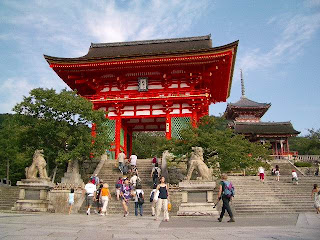


The temple takes its name from the waterfall within the complex, which runs off the nearby hills. Kiyomizu (清水) literally means pure water, clear water or limpid water is notable for its vast veranda, supported by hundreds of pillars, that juts out over the hillside and offers impressive views of the city.

Kiyomizu commands an exalted spot on a steep hill in eastern Kyoto. The quaint street leading up to the temple is lined with souvenir shops, restaurants and ryokan (Japanese-style inns).

The main hall of Kiyomizudera is notable for its vast veranda, supported by hundreds of wooden pillars, which juts out over the hillside and offers beautiful views of the city.
Beneath the main hall is the waterfall Otowa-no-taki, where three channels of water drop into a pond. Visitors to the temple collect the water, which is believed to have therapeutic properties, from the waterfall in metal cups or commemorative plastic cups. It is said that drinking the water of the three streams confers health, longevity, and success in studies.




The temple complex contains several other shrines, notably Jishu-jinja, dedicated to Okuninushino-Mikoto, a god of love and "good matches". Jishu-jinja possesses a pair of "love stones" placed 18 metres apart, which lonely visitors attempt to walk between with their eyes closed. Success in reaching the other stone, eyes closed, is taken as a presage that the pilgrim will find love. One can be assisted in the crossing, but this is taken to mean that an intermediary will be needed. The person's romantic interest can assist them as well.

The complex also includes all the fixtures of a popular temple, being one of the most-visited attractions of the city: hawkers offering various talismans, incense, and o-mikuji (paper fortunes ranging from "great fortune" to "great ill") abound. The site is particularly popular during festivals (especially New Year's and o-bon in the summer) when additional booths fill the grounds selling traditional holiday foodstuffs, among other things, and the crowds are immense.
The temple is also a particular haven for students wishing the aid of deities in graduation, and is well known for having trees (and backdrops, etc.) covered with paper wishes tied there by the hopeful.
The popular expression "to jump off the stage at Kiyomizu" (「清水の舞台から飛び降りる」) is the Japanese equivalent of the English expression "to take the plunge". This refers to an Edo period tradition that held that, if one were to survive jumping from the stage, one's wish would be granted.
No comments:
Post a Comment